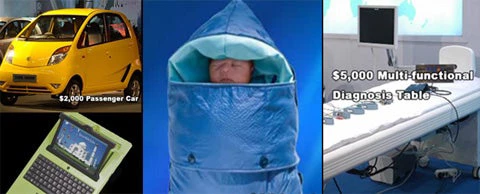Read this post in Chinese
WBI recently convened a workshop at Harvard University with many prominent faculty, partners from the Omidyar Network, Growth Dialogue and representatives from the Governments of India, China, Brazil, and South Africa.
Our topic was 'inclusive innovation' premised on the idea that the fruits of innovation do not automatically accrue to low-income groups. In India for example, hundreds of millions of rural poor lack access to electricity, water, and sanitation while tech hubs grow and thrive in urban centers. We debated the merits of supporting policies, programs, and funding instruments to ensure a more equitable distribution of the dividends of innovation and the role of public policy in achieving this end. Putting users at the heart of the design process was a constant theme. How do we design with rather than for low-income populations? The creative process should include BoP groups upfront not ex poste.
Having lifted nearly five hundred million people out of poverty between 2005-2010, China and India are global laboratories for what's working, what's not, and what's possible in areas like pro-poor or frugal innovation. Appropriate technologies, sometimes low cost varieties, coming from markets in Asia and Africa are responding to consumer demand in under-served markets. The example of M-pesa or mobile money in Kenya is a case in point. This financial services innovation emerged in Africa because of the number of un-banked people who needed access to formal financial services. Implications of mobile money, however, go far beyond Kenya and extend to the need for efficient remittances between rural and urban populations in many markets. But what was the role of policy, government, and private actors in seeding this innovation and can this formula be replicated in other markets? What did government regulation do right or in this case how did a lack of regulation facilitate testing, learning, and innovation?
Personally, I'm suspicious of high level policy frameworks and abstract discussions about the importance of innovation particularly in producing tangible value for low-income groups. It's about listening to those who face constraints, engaging constructively with multiple stakeholders, and building implementation capacity of policy makers and regulators. The experience of the World Bank's Development Marketplace program and partners like Ashoka suggest that social innovators confront and solve problems everyday that affect low-income populations. And they often do this without enabling institutions to pave their way; they find solutions where markets and governments fail.
But what if we could remove the obstacles for those serving the bottom of the economic pyramid? What would it look like to create enabling conditions for social innovators to scale-up and work with government to solve our hardest social challenges (like youth unemployment or urban poverty)? What if we listened to those who constantly innovate and asked them how they could do more?
My big take-away from the Harvard roundtable was the importance of de-bottlenecking innovation that is already happening. It's less about creating it and more about finding it, funding it, and supporting it to scale-up. What can we learn from successes and failures in India, China, Brazil, and Africa where previously excluded populations have benefited from innovations that provide measurable value (e.g. m-health, m-finance, mobile telephony)? What are the business model innovations that have allowed previously excluded groups to be included in markets?
To be effective, this conversation must be concrete and begin with specific problems in specific settings that need solving. While solutions may be context-specific, the processes used to get to answers can be shared and scaled across geographies. Perhaps the appropriate role for the World Bank and our global partners is to convene the right people at the right time to work on the right problems to make a difference to those at the bottom of the economic pyramid. Where should we start?



Join the Conversation